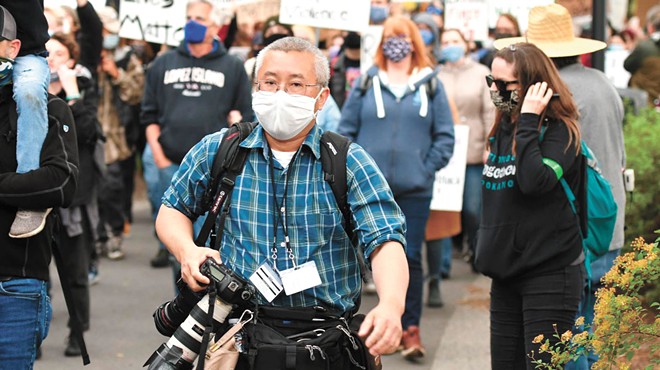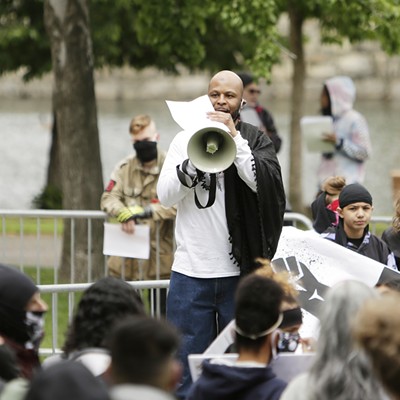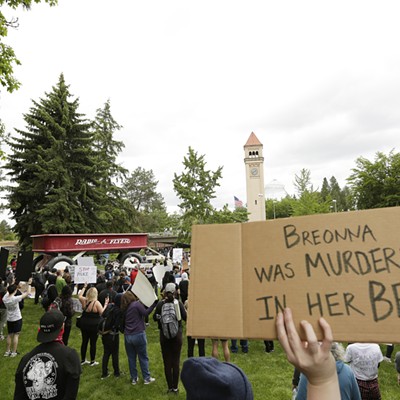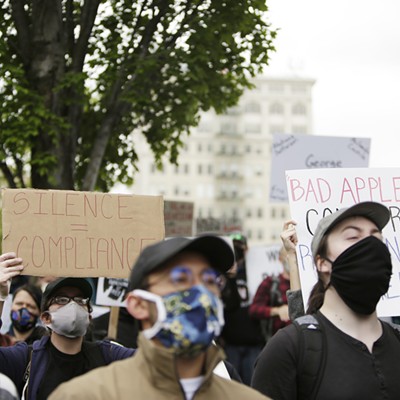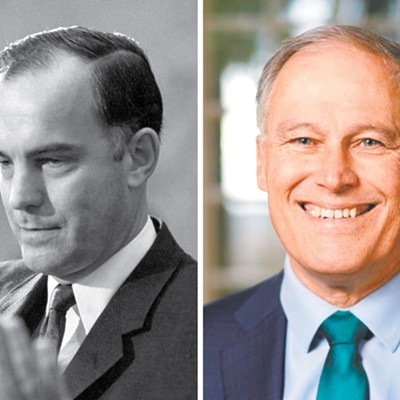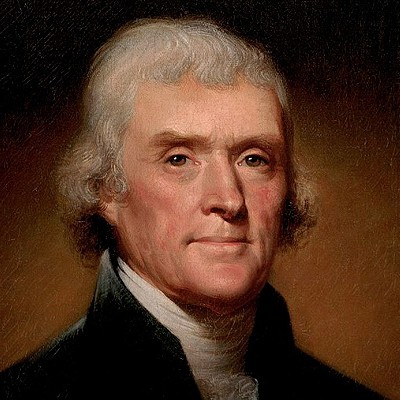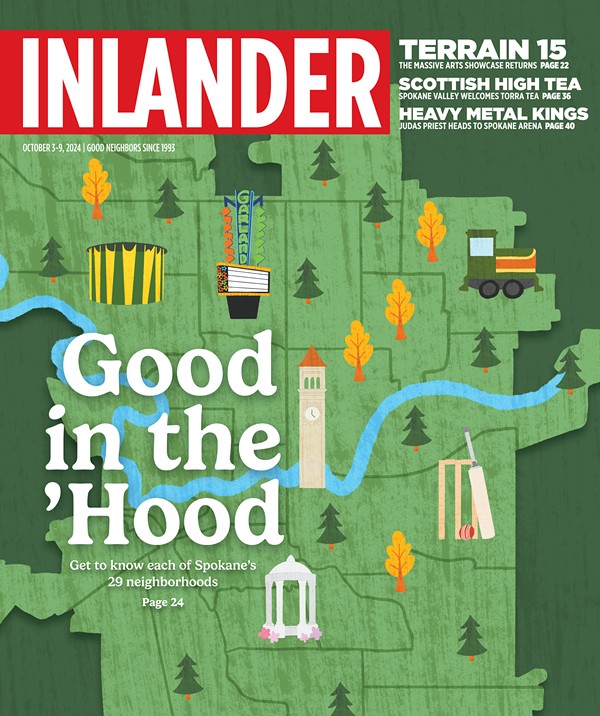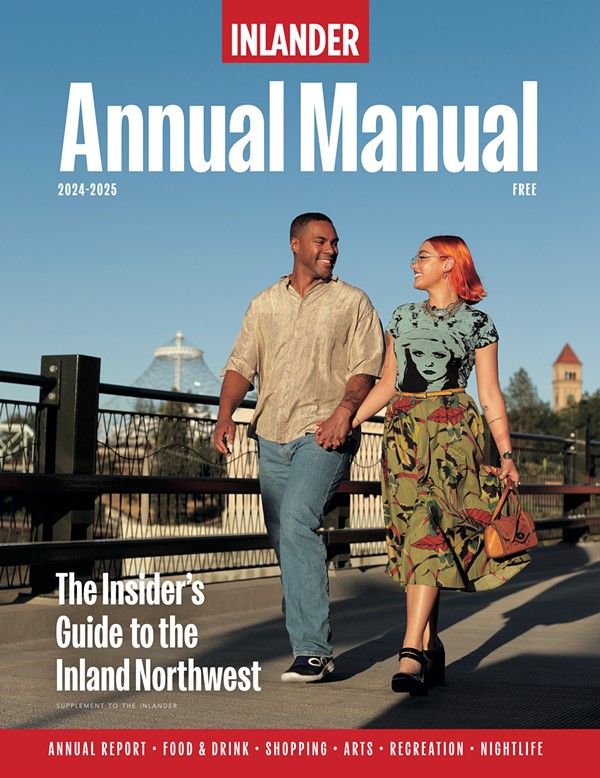
Turn on your television. The nation is burning. Since the horrific murder of George Floyd in Minneapolis on May 25th, protests have sprung up across the country. Although demonstrations have been primarily peaceful, protestors on the ground have recorded videos of police and counter-protestors provoking people with excessive violence, sparking riots in many major cities. But these riots are about more than the injustice against the names heard chanted at protests: George Floyd, Breonna Taylor, Ahmaud Arbery, Tony McDade — the names of the most recent victims of racialized violence. Black people have not been able to breathe for centuries.
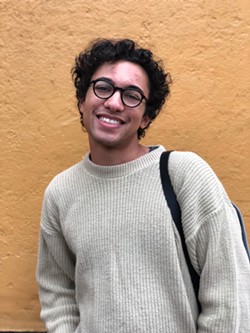
Turn off your television. Look outside your window. Washington is burning. Just as the nation has been burning for quite some time now, the fire of racism has torched our state for just as long. The only problem is, we like to pretend it doesn’t exist.
Growing up in Spokane, locals beat into my consciousness what I like to call the Evergreen State Axiom: Washington is the perfect place to raise a family. Generally speaking, it is. In the neighborhood where I grew up in the heart of a liberal city in an even more liberal state, everyone around me lives a relatively comfortable life. Near nature, near perfect — Spokane’s charming motto. Walk down the street, and everyone will say, “Hello.” To put the cherry on top, Washington is one of the most progressive states in the country. And yet, in spite of all this, I’ve never been able to shake the feeling that something isn’t right. I kept hearing that Washington is the perfect place to grow up and thought to myself, why doesn’t it feel perfect to me?
As I grew older, my family engaged in a multitude of conversations regarding race. We discussed topics such as the legacy of our racialized criminal justice system; the role of teachers and professors in providing extra support for students of color; the implications of white people using the n-word, even when singing songs. As my sister and I grew older and developed a more comprehensive vocabulary, our conversations grew more complex. We challenged what we previously believed about the world. My parents taught us to engage with what we learned in the world and challenge the people around us when we noticed injustice in any form. But it wasn’t that easy.
How could a progressive from Washington with a Black Lives Matter sign in their front yard possibly be racist?
tweet this
As I challenged people on the things they said, they trivialized my perspective. My memories are shrouded by a dark cloud of unhappiness and feelings of inconsequentiality from years of being denied the faculty to justify my experiences. Daily, I would find racial bias in people’s actions, imploring me to respond. Daily, they would shut me down. They refused to consider that they said something even remotely wrong and degraded my experiences to something that could be refuted. How could a progressive from Washington with a Black Lives Matter sign in their front yard possibly be racist?
People refuse to accept my experiences as evidence to prove that what I experienced was racism. To them, my life is not worthy enough to convince them that their actions are harmful, and the constant resistance reached a point where I became too exhausted to respond anymore. I could no longer bring myself to tell even my best friends that the n-word is not just a word. Hate grew within my heart. I vowed I would never say “Washington is the perfect place to raise a family.”
I have found that people subscribe to something I call Washington Exceptionalism, an idea that touts the state as one of the most forward-thinking places in the country. According to US News and World Report’s “Best States” rankings, Washington is ranked number one overall in the nation with sub-rankings of four in healthcare and education, three in the economy, and two in infrastructure. Who wouldn’t be proud to live in Washington?
Despite this shiny report card, the specter of racism lurks within the state, and not just as the (albeit few) racist communities but the words and attitudes within even the progressive homes that line our streets. Because of Washington’s lack of diversity, we are physically removed from the experiences of black people. Since the state as a whole is only 4.3% black and Spokane only 2.2%, citizens here can live comfortably without ever witnessing violence against black people. They are separated through a screen, watching with sympathy in their eyes, but the moment their evening pint of IPA runs dry, they turn it off and walk away. People here don’t even need to wait until the images become too difficult to bear. As a result, they refuse to be challenged on their conceptions of the nation and the struggles of black people.
Yes, it is true that people across the nation tune into atrocities such as the murder of George Floyd in Minneapolis, but they do not see everyday instances of racism. People are allowed to pretend it doesn’t exist. They retreat behind the progressive monolith that is Washington and deny their inextricable involvement in the structural racism that plagues this country.
During these past weeks of violence against black people, I have seen hundreds of posts on almost every social media platform denouncing racism. The people who make these posts project an image of equality that is much needed in the world, but they are also the people who become defensive when a black person calls them out for ignoring how our police system is based on racist practices, the people who become frustrated when college groups advertise support for black students in need because white students are just as deserving, the people who claim that they can say the n-word because it ends in “-a” instead of “-er.” What good is your activism if you can’t respect the individuals you claim to support? To them, the black people who they see on the television and the black people they interact with are two separate kinds of people: those who deserve a Facebook post and those who are “being too sensitive.”
People in Washington distance themselves from the violence of murderers such as Derek Chauvin, the police officer charged with murdering George Floyd, and Gregory and Travis McMichael, the men charged with murdering Ahmaud Arbery, but they ignore their ability to be people just like Amy Cooper, the woman who called the police on Christian Cooper in Central Park. Upon being fired by her employer, she apologized, saying, “I'm not a racist. I did not mean to harm that man in any way.” No one will claim the title of being a racist (not even Cliven Bundy, who said black people might have been better off as slaves). But arguably she did want to harm him. In the video that captured Amy Cooper, she said “I'm going to tell [the police] there's an African American man threatening my life.” Even liberals who would never think of harming a black person know the power of stating a black man’s race when calling the police. She knew what she was doing — you can hear it in the spite in her voice. Even if someone claims they are opposed to racial injustice, they know the power of race. Four centuries of racism have taught us that black lives are seen as expendable, and that the white person holding the phone has the power to expend that life at a moment’s notice.
The flawed exceptionalism of Washington is what breeds people like Amy Cooper, who sincerely believe that they could never be racist. Someone doesn’t have to be a white supremacist to contribute to racist structures. By devaluing black lives, people contribute to the denial of equal access to jobs, education, clean water, and healthcare, which is particularly pertinent in the age of COVID. Washington may work towards combatting some of these inequalities but people, nevertheless, ignore black experiences.
When a black person says, “that is offensive,” you cannot say “no it is not.” When a black person says, “that is racist,” you cannot say “no it is not.” The black person is the one affected, not you.
Invalidating black people’s experiences contributes to the destruction of black lives. In her book Citizen, Claudia Rankine writes, “because white men can’t / police their imagination / black people are dying.” The first step in the killing of black lives is the imagination of what black lives can be. White people delineating what does and does not contribute to oppression strips black people of the ability to govern their own lives. When white people deny black people the agency to defend their perceptions of racism, white people participate in the social destruction of the black person.
Black people are seen as dispensable in America. They have always been seen that way, and it is not just the white supremacist who imagines the black life as one that should be destroyed, but also the white progressive who subconsciously imagines the black life as one that could be destroyed. The constant negation of black people’s experiences strengthens the force that strives to denigrate the mental and physical existence of the black body. Your words, whether conscious or not, possess a magnifying impact.
Washington Exceptionalism veils this national ill. When we laud ourselves for the greatness of the state, we project the image that we are the end-all-be-all of progressiveness. We tell the country how it should act, how it should think, but deep down, we lie at the foundation of our racist country. True exceptionalism is earned through a commitment to combating local, state, and national injustices through providing community support, social services, and a critical reform of almost every governmental system. We can’t call ourselves great when police officers are spraying children with mace. We can’t call ourselves great when Washington’s “progressive policies” negatively impact black communities. We can’t call ourselves great when we, even progressive whites, continuously invalidate black lives. We devalue black lives to be nothing more than an inadequate claim backed up by unsubstantiated anecdotes. We project that black opinions are secondary to white opinions. We project that black lives are secondary to white lives.
As Bernice King so succinctly put it, “Racism is not a difference of opinion.” We cannot consider ourselves to be exceptional if we cannot grasp this simple fact. Whether or not you see it to be convincing, whether or not you have read it in a quantifiable study, choosing to believe in the inexistence of the black experience, choosing to commit to your stance that nothing you say could be offensive, is to destroy the black life.
In Spokane, my family had a friend who was very much a part of our lives. We went skiing together, we played music together, we celebrated holidays together. He is no longer in our lives for various reasons, but he left my life in 2014 when he and my parents were arguing about Michael Brown’s death. I had been pretending to be asleep while I listened to their voices slowly rise from the living room. When the anger in my chest rose to a fever pitch as I heard him defend the merits of his murder, I ran downstairs and joined the “debate” about the validity of another child’s life. All night, he refused to accept my tears of commitment to Michael Brown’s life as anything that could be regarded as evidence to prove his death was an act of racist police brutality. Hours of shouts culminated with him saying, “if you don’t cooperate with the police, you get what’s coming,” but that isn’t what I heard. In my sixteen-year-old ears, I heard Michael Brown deserved to die.
To be silent about racism, to deny the existence of the dark shadow that looms over us, is to strengthen racism.
tweet this
He didn’t just imagine the validity of a black life, but the necessity of black death. I heard the threat and hatred in his voice, and I am consumed some nights with the knowledge that people who enter my house can have an utter disregard for black lives based off of false conceptions of the reality of the insidiousness of racism in America. But this man does not fit the archetype of the violent white supremacist. He has a bisexual son. He had been friendly to me and my family. His family’s best friends were black — something he was convinced absolved him of any critiques of racism — but that is the problem. He represents the kind of person that occupies the homes of Washington: the one who touts Washington Exceptionalism but rejects the possibility that they contribute to the structural racism that plagues the nation.
He didn’t think his words were racist. He thought that I was arguing for an opinion, that the validity of a black life was an opinion — something to be refuted. Racism is not a difference of opinion. To be silent about racism, to deny the existence of the dark shadow that looms over us, is to strengthen racism. Within the arsenal of quotes shared across Instagram is one from Desmond Tutu, “If you are neutral in situations of injustice, you have chosen the side of the oppressor.” Silence is complicity. Denial is reinforcement.
But black people have persevered for centuries despite the determination of our country to destroy us. Activists have devoted their lives to racial uplift. Writers like Frederick Douglass, Ralph Ellison, James Baldwin, Toni Morrison; fighters like Nat Turner, Muhammad Ali, Malcolm X; intellectuals like Ida B. Wells, W. E. B. DuBois, Angela Davis; singers like Billie Holiday, Duke Ellington, Aretha Franklin, Nina Simone; believers like Sojourner Truth, Huey P. Newton, Martin Luther King Jr.; the people on TV, the people on the radio, the people on blogs, every single person who has stood up in protest are the ones who are to thank for our progress in the world. But there is so much more to do.
Progress lies in praxis by everyone. We cannot rely on the revolutionaries of the next generation to change the world. Sharing information is beneficial and necessary, but people cannot stop there. Yes, post articles, post quotes, post your solidarity for those who have suffered and for those who will continue to suffer. Flood your social media feeds so that no one can escape the uncomfortable. Make them face the atrocities of our world until they realize that their state cannot be exceptional when this country has been so horrible. Force them to engage, but don’t stop there. We must put our words into action, we must donate, we must vote, we must organize, we must protest, we must listen to black people when they call out the violence of our world.
Most of the time, I am proud to call myself a Washingtonian. We have made strides towards advancing the position of black people, but we have a long way to go. I am disgusted when people look at the riots on the television and cry out at the atrocities of the broken windows of the Nike World. The only reason why people are listening is because your buildings are burning. While economically crippling to some, the atrocity of this world is not the vandalism of an international store. The atrocity of this world is that black people are devalued, that black people are brutalized, that black people cannot breathe.
This is a never-ending fight. We cannot live our lives believing that these are only periodic instances of injustice. For some, this is everyday life. So, I implore you to evaluate the way you navigate your everyday life. After years of fighting with people to change, I have found that I can’t tell people what they should do or say or think, but I can ask them to consider whether their actions honor or degrade someone else’s humanity.
I ask of you to listen to black people. I ask of you to trust black people when they disclose their struggles. It can be difficult for black people to relive their trauma constantly only for the people to invalidate them. It wears us down. It fills our hearts with anger and makes us feel as if the world does not care about us.
I ask of you to question if you have ever said anything that could be considered to be anti-black. I ask of you to ponder your response before you engage in a conversation. I ask of you to reflect on if you have ever contributed to the structural denial of the multitude of black experiences. I ask of you to consider if you have ever gotten defensive when someone has challenged you on something that you said. Are you getting defensive as you read this?
I understand these may be uncomfortable topics of introspection, but remember, black lives are not an area of dispute. ♦
Maxwell Gillmer is a Spokane native and is currently attending Harvard University. He is majoring in African American Studies and hopes to pursue a Ph.D. in English.
